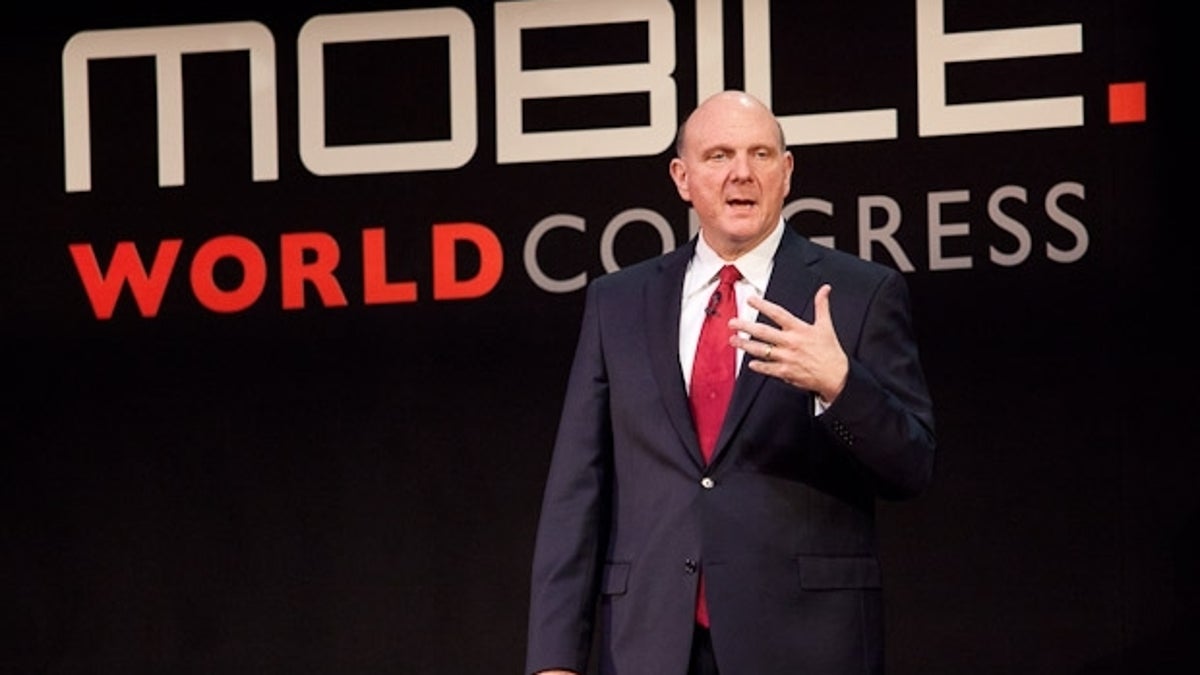Microsoft CEO: Mobile is all about the platform
Microsoft's CEO Steve Ballmer in his opening keynote address at the Mobile World Congress where he emphasized that the battle in mobile is more about the software platform rather than individual devices.

BARCELONA, Spain--The battle for the mobile consumer is no longer about who has the coolest device, but rather who has the most compelling ecosystem. That's the message from Microsoft CEO Steve Ballmer, who took the stage to kick off this year's Mobile World Congress.
A year ago, Ballmer was here to launch the company's revamped mobile operating system, Windows Phone 7. This year, devices with the OS have been on the market for four months, and the company has about 8,000 apps in its market. Microsoft also just announced a partnership with the world's largest phone maker, Nokia, which could help give Microsoft's OS some traction.
That would be significant for Microsoft, which is in the fight of its life with Google and Apple in the mobile arena.
"The mobile market is moving from a device battle to a platform battle," Ballmer said. "Consumers won't just pick a phone. They'll be selecting a platform."
In an effort to highlight the strengths of Windows Phone 7, Joe Belfiore, a Microsoft vice president, demonstrated existing and upcoming features. He showed how people can take pictures and access services that are immediately connected to the cloud. Belfiore also showed off Microsoft "hub" capabilities, which allow people to organize services and content.
Belfiore offered a peek at the future, including support for Internet Explorer 9 with hardware enhancements on the Windows Phone 7 software. The mobile version of the browser will support the same standards (HTML5 and so forth) and hardware accelerated graphics as the PC version. He showed a Windows Phone using IE9 with hardware acceleration next to an Apple iPhone 4 running Apple's Safari browser. The difference was striking as fish on a Web page moved swiftly across a screen when IE9 was in use--and slowly and jerkily on the iPhone 4 with Safari.
Finally, Belfiore demonstrated how Microsoft's Kinect game peripheral will be integrated with the mobile platform. A new Microsoft Kinect companion will allow people to play Kinect games with their phones by using the touch screen to interact with games.
Microsoft is trying to set its OS apart from Apple's iOS and Google's Android, both of which have grabbed the attention of developers and consumers.
Ballmer said the company has more than 8,000 applications in its market, is rapidly adding more, and has registered more than 30,000 developers. This is still a far cry from Google or Apple, which have apps in the tens and hundreds of thousands. But Ballmer noted that the Microsoft app market has only been online for four months.
He sees the Nokia partnership, announced late last week, as a critical step. He invited Nokia CEO Stephen Elop on stage. As he did at a Nokia press conference last night, Elop said both companies will benefit from the partnership, in which Nokia will use Windows Phone 7 as its primary OS going forward.
Elop again emphasized the importance of creating a "third" ecosystem to give consumers and wireless carriers more choice. Another big message from Ballmer and Elop: they want the Windows Phone ecosystem to be the best and easiest operating system for wireless operators to work with.
"Of course wireless operators want more alternatives that will [help] them to add value," Ballmer said. "And Windows Phone will be the most operator-friendly OS on the market."

